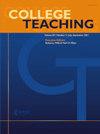University Student Perspectives on Mental Health: A Qualitative Analysis Post Mental Health Seminar
Q3 Social Sciences
引用次数: 0
Abstract
The state of mental health has become increasingly concerning, particularly with the impact of the COVID-19 pandemic. Emerging adulthood is a time of adjustment and growth, and for many youths this includes attending college. The transition to college often comes with significant challenges that impact student mental health. This study uses thematic analysis to analyze qualitative responses from focus groups with college students (N = 22) following an innovative credit-bearing mental health course at a large university in the Southern U.S. Students discussed various aspects of mental health, including stressors such as academic rigor, social expectations, and challenges to seeking mental health care. In addition to stressors, students highlighted engaging in coping strategies such as physical health, positive relationships, spirituality, and more to manage stress, which suggests students applied skills garnered in the mental health course. Implications for practice and research are discussed. [ FROM AUTHOR] Copyright of College Teaching is the property of Taylor & Francis Ltd and its content may not be copied or emailed to multiple sites or posted to a listserv without the copyright holder's express written permission. However, users may print, download, or email articles for individual use. This may be abridged. No warranty is given about the accuracy of the copy. Users should refer to the original published version of the material for the full . (Copyright applies to all s.)大学生心理健康观:心理健康研讨会后的定性分析
心理健康状况越来越令人担忧,特别是在2019冠状病毒病大流行的影响下。成年初期是一个适应和成长的时期,对许多年轻人来说,这包括上大学。向大学的过渡往往伴随着影响学生心理健康的重大挑战。本研究采用专题分析的方法,对美国南部一所大型大学的大学生(N = 22)进行焦点小组的定性反应进行分析。学生们讨论了心理健康的各个方面,包括学术严谨性、社会期望和寻求心理健康护理的挑战等压力源。除了压力源,学生们还强调了应对策略的参与,如身体健康、积极的人际关系、灵性等,以管理压力,这表明学生们运用了在心理健康课程中获得的技能。讨论了对实践和研究的启示。College Teaching的版权归Taylor & Francis Ltd所有,未经版权所有者的明确书面许可,其内容不得复制或通过电子邮件发送到多个网站或发布到listserv。但是,用户可以打印、下载或通过电子邮件发送文章供个人使用。这可以删节。对副本的准确性不作任何保证。用户应参阅原始出版版本的材料的完整。(版权适用于所有人。)
本文章由计算机程序翻译,如有差异,请以英文原文为准。
求助全文
约1分钟内获得全文
求助全文
来源期刊

College Teaching
Social Sciences-Education
CiteScore
1.50
自引率
0.00%
发文量
33
期刊介绍:
College Teaching provides an interdisciplinary academic forum on issues in teaching and learning at the undergraduate or graduate level. The journal publishes three kinds of articles. Regular, full-length articles of up to 5,000 words reporting scholarship on teaching methods, educational technologies, classroom management, assessment and evaluation, and other instructional practices that have significance beyond a single discipline. Full-length articles also describe innovative courses and curricula, faulty development programs, and contemporary developments. Quick Fix articles, up to 500 words, present techniques for addressing common classroom problems. Commentaries, up to 1,200 words, provide thoughtful reflections on teaching.
 求助内容:
求助内容: 应助结果提醒方式:
应助结果提醒方式:


